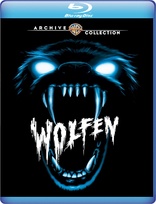Wolfen Blu-ray Movie
HomeWolfen Blu-ray Movie 
Warner Archive CollectionWarner Bros. | 1981 | 114 min | Rated R | Jun 02, 2015
Movie rating
6.5 | / 10 |
Blu-ray rating
| Users | 3.5 | |
| Reviewer | 4.0 | |
| Overall | 3.5 |
Overview
Wolfen (1981)
A New York cop investigates a series of brutal deaths that resemble animal attacks.
Starring: Albert Finney, Diane Venora, Edward James Olmos, Gregory Hines, Tom NoonanDirector: Michael Wadleigh
| Horror | Uncertain |
| Thriller | Uncertain |
| Sci-Fi | Uncertain |
Specifications
Video
Video codec: MPEG-4 AVC
Video resolution: 1080p
Aspect ratio: 2.40:1
Original aspect ratio: 2.39:1
Audio
English: DTS-HD Master Audio 5.1 (48kHz, 24-bit)
Subtitles
English SDH
Discs
50GB Blu-ray Disc
Single disc (1 BD)
Playback
Region free
Review
Rating summary
| Movie | 4.0 | |
| Video | 4.5 | |
| Audio | 4.5 | |
| Extras | 0.5 | |
| Overall | 4.0 |
Wolfen Blu-ray Movie Review
Territorial
Reviewed by Michael Reuben May 28, 2015Wolfen masquerades as a werewolf movie, but it's something else. Appearing in the same year as The Howling and An American Werewolf in London, the film initially seemed like a typical case of Hollywood's copycat syndrome—until people actually saw it. Director and co-writer Michael Wadleigh, making his first film since the landmark 1970 documentary Woodstock, had transformed novelist Whitley Strieber's horror tale about super-predators into a kind of mystical science fiction. Wadleigh's ambition to create a panorama of contemporary urban life across which the story's police detectives tracked their mysterious killers resulted in a director's cut that was late, over budget and far too long—or at least so claimed the film's producers, who fired the novice fiction director during post-production. The ensuing arbitration led to key changes in the standard contract used by the Directors Guild of America, but they came too late to salvage Wadleigh's version of Wolfen. The film was released on July 24, 1981—a year later than planned—and Wadleigh's name remains on it, despite his request to have it withdrawn. The director has never made another non-documentary film. Despite Wadleigh's dismissal, much of his vision survives in the extant version of Wolfen, because it is central to the story's design. Wolfen is set in a shattered urban landscape that raises fundamental issues about modern life that remain with us today. (What the Bronx was in 1980, Detroit is now.) As the police investigation seeks a solution for murders that stubbornly resist easy explanation, the investigators keep coming up against conflicts that resonate far beyond the case they are investigating. As the best sci-fi often does, Wolfen peers into an alternate world, but that world reflects our own back at us.
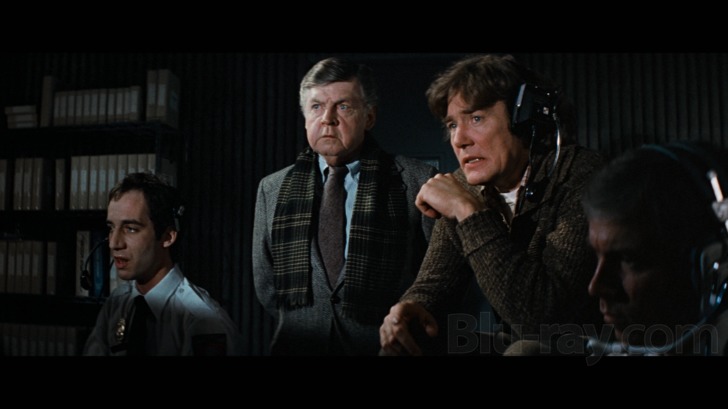
The police investigation in Wolfen is triggered by the murders of a New York City power couple, Christopher and Pauline Van der Veer (Max M. Brown and Anne Marie Pohtamo), along with their bodyguard, in the early morning hours in Battery Park at the southern tip of Manhattan. As the Dutch name suggets, Christopher Van der Veer comes from one of the city's oldest families. A major land owner and developer, he has just broken ground on a huge project in the South Bronx, which, in this era, had been reduced to block after block of crumbled wreckage. (The film's scenes of urban decay were shot on location and were not simulated.) Because of the family's wealth and power, suspicion immediately focuses on a radical group, the Götterdämmerung faction, which has publicly declared itself an enemy of the privileged class. Van der Veer's niece (Sarah Felder) belongs to a similarly inclined group. But the details don't fit the pattern of a political assassination. The murders are gory and graphic, with bodies torn apart and a head nearly severed. The senior police official in charge of the investigation, Warren (Dick O'Neill), recalls Capt. Dewey Wilson from psychological leave because Wilson is his best investigator, and the crime is "very weird and very strange, just like you". Wilson is played by Albert Finney, who was Wadleigh's personal choice for the role. With the city's highest officials looking over his shoulder, the captain find himself paired with Rebecca Neff (Diane Venora), an expert on terrorist groups retained by Executive Security, the company responsible for the Van der Veers' protection, which is naturally concerned for its reputation. It's ES that insists on pursuing the terrorist angle, and its investigation allows Wadleigh to explore themes of wealth, inequality and the use of violence to effect social change that remain every bit as current as when Wolfen was made. (The director makes a cameo as an informant.) But Dewey Wilson rapidly concludes that the solution to the crime lies elsewhere. Wilson focuses on Eddie Holt (Edward James Olmos, young and almost unrecognizable), a radical Native American recently released from prison and now working construction. Holt was seen throwing rocks at the Van der Veers' limousine the night they were killed, and he is hostile and cryptic when Wilson questions him. But trace evidence gathered by Wilson's friend from the coroner's office, Whittington (Gregory Hines in a breakout performance), suggests that the killer was an animal—a fact confirmed by Ferguson (Tom Noonan), a zoologist at the Central Park Zoo. Even more disturbing is the fact that similar trace evidence is found on body parts recovered in the South Bronx, miles away from the murder site, by workmen excavating the Van der Veer project. The killer or killers seem to be choosing targets at random, and the victims are both unconnected and widely dispersed. Except for a pair of burning red eyes glimpsed briefly in the dark, Wadleigh keeps his predators out of sight until late in the film. But he routinely shows the world from their point of view, starting with the Van der Veer murders and returning to their perspective periodically thereafter. Wolfen was one of the first films to utilize the kind of thermographic photography later made familiar in the Predator series, and the novelty of the process was one of many factors that delayed the film's completion. The ability of the titular villians (if they are villains) to evaluate emotional states through changing heat signatures and elevated heart rates (which they can hear) is only one of their many advantages. With the exception of Albert Finney, Wadleigh made a point of casting unfamiliar faces to give Wolfen a sense of realism. Venora was making her film debut, while Hines, Olmos and Noonan were only beginning their film careers, but all of them were accomplished stage actors who knew how to make an impression. The offbeat cheerfulness of Hines's coroner is especially memorable, as is the detached professionalism of Venora's expert, who is perfectly calm when dealing with standard-issue human terrorists, but quickly loses her composure as she realizes that she's tracking something else. The realism is enhanced by the extensive location photography, which captures both the decrepitude of New York City at the end of the Seventies, just before it began its slow climb back to economic vitality, as well as the pockets of wealth that managed to survive while the rest of the city crumbled. The contrast is an essential element in Wadleigh's thematic design. It's only a guess, but if Wadleigh had been allowed to complete his version, Wolfen would probably have additional episodes exploring economic forces. The 114-minute film that survived is largely an exercise in sustaining an atmosphere of dread, as the authorities build a case against the Götterdämmerung faction (mostly by ignoring the evidence), Wilson is more and more convinced that he's dealing with a mystical killer, and victims multiply. The ending is where the battle between Wadleigh and his producers is most evident, because it is rushed and leaves too many narrative questions unanswered. (One has to wonder what Capt. Wilson will write in his police report.) But the essential themes have been sounded, and they still resonate. (Note: The WAC presentation of Wolfen does not include the short scene featuring an appearance by Tom Waits, although he can be heard briefly singing on the soundtrack.)
Wolfen Blu-ray Movie, Video Quality 
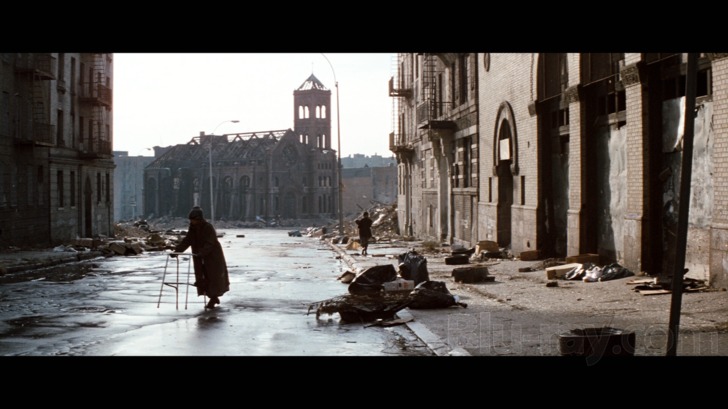
Wolfen was shot by British cinematographer Gerry Fisher (Highlander and The Exorcist III) in anamorphic widescreen. Having directed Woodstock, Wadleigh was familiar with the challenges of shooting on location, but one can only imagine the security precautions required to film in the crime-ridden South Bronx of the early Eighties. The only structure created by the production company was the derelict church that serves as a point of reference; everything else was shot "as is". The Warner Archive Collection's 1080p, AVC-encoded Blu-ray provides a very fine reproduction of Fisher's lighting, which ranges from the cheerful sunlit daytime in Battery Park, where the ravaged bodies are found, to the clinical autopsy tables of the morgue, where Dewey Wilson snacks indifferently while awaiting results, to the dark interiors of Executive Security, where technicians and supervisors peer at dials and readouts, while suspects are interrogated in the neighboring room. The image has a pleasingly film-like texture, with just an occasional hint of sharpening here and there. Black levels are very good, and the color palette is generally realistic, with the obvious exception of the thermographic vision that indicates the killer's point of view. The film's grain pattern is visible but never intrusive. WAC continues to encode at high average bitrates. Its target seems to be 35.00 Mbps, which is the average on this disc.
Wolfen Blu-ray Movie, Audio Quality 
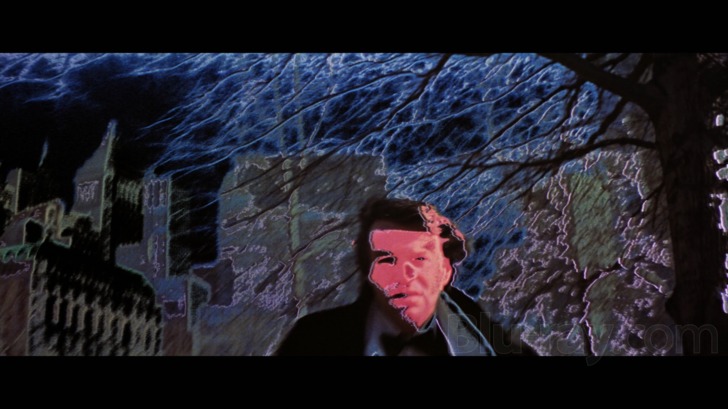
Like Outland and Altered States, Wolfen was released on both 35mm prints in Dolby Stereo and on 70mm in a six-track mix utilizing the short-lived "Megasound" format that enhanced low frequencies. Warner's 2002 DVD had a stereo track, but WAC's Blu-ray comes with a 5.1 track encoded in lossless DTS-HD MA. WAC went to great effort to obtain the "Megasound" mix for the Blu-ray's track, and the results are worth it, because the bass extension is impressive at numerous points, including gun shots, various sounds of city life, heartbeats heard by the title "villains" and some of the deeper notes in James Horner's score (from which Horner cribbed various elements for Aliens three years later). Stereo separations are distinct, dialogue is clear and the track has excellent fidelity overall.
Wolfen Blu-ray Movie, Special Features and Extras 
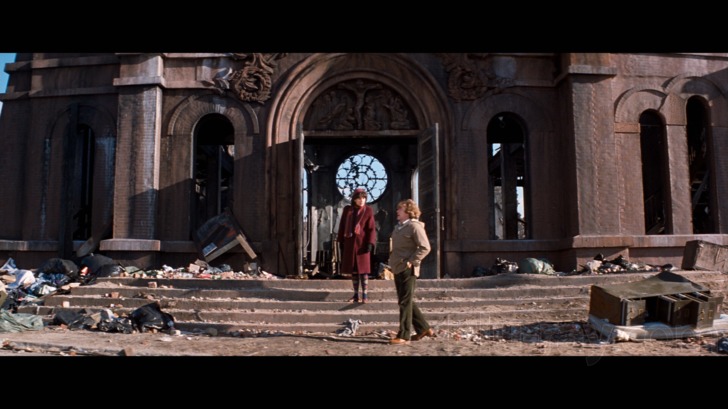
Except for a trailer (480i; 1.78:1, enhanced; 2:17), the disc has no extras. Warner's 2002 DVD was similarly featureless.
Wolfen Blu-ray Movie, Overall Score and Recommendation 
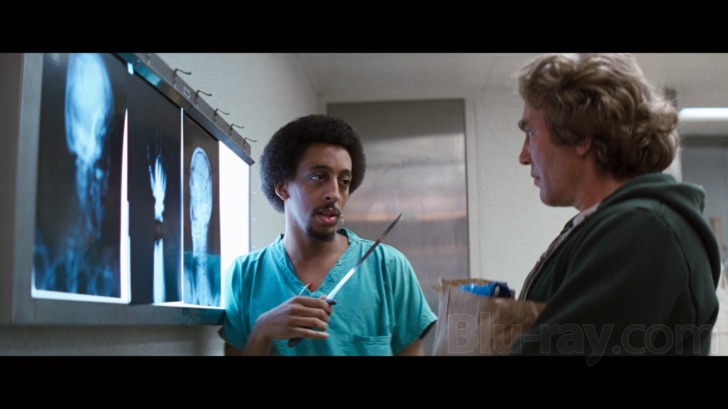
It is doubtful whether Wadleigh's version of Wolfen can ever be reconstructed, as happened recently with Clive Barker's Nightbreed. Contemporary accounts of the dispute between the director and his producers suggest that the director's cut was never completed. Indeed, a crux of the dispute was the repeated postponement of the release date, because scenes remained to be filmed, and Wadleigh contended that he was denied the opportunity to preview his version before an audience. In any case, what remains is a unique and impressive film, and WAC has brought it to Blu-ray with its customary care. Highly recommended.
Similar titles
Similar titles you might also like

The Medusa Touch
1978

Q: The Winged Serpent
1982

Doctor X
Warner Archive Collection
1932

The Fly
Fox Studio Classics
1958

The Wolfman 4K
Collector's Edition
2010

Tales of Halloween
2015

The Mystery of the Wax Museum
Warner Archive Collection
1933

Masters of Horror: Season One, Volume I
2005

The Vampire
Mark of the Vampire
1957

Mimic 2
2001

C.H.U.D.
1984

Alligator 4K
1980

God Told Me To 4K
1976

It's Alive
1974

Jigsaw 4K
2017

Child's Play
2019

Jungle Captive
1945

The Bye Bye Man
2017

Konga
1961

Victor Frankenstein
2015
